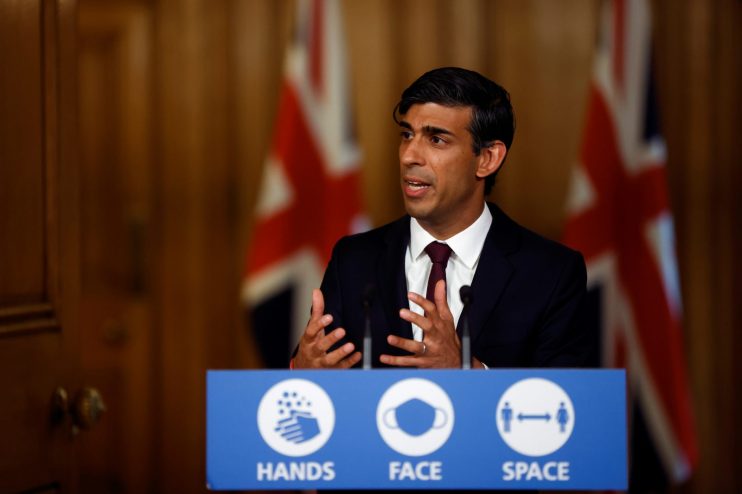Rishi Sunak extends furlough scheme until end of March

Chancellor Rishi Sunak has extended the furlough scheme until the end of March, following days of wrangling over fresh financial support for businesses during the second national lockdown.
The furlough scheme, which was due to wind down last Saturday, will be rolled out for the next five months — a year after it was first introduced, Sunak announced in the Commons today.
The chancellor said the government will pay up to 80 per cent of wages for staff unable to work during local and national lockdowns across the country.
Sunak announced the government will suspend the job retention bonus, which was due to hand employers £1,000 for every furloughed member of staff returned to work.
The chancellor said the government will “redeploy” the retention bonus “at the appropriate time”.
He also announced an extension to income support grants for the self-employed to cover 80 per cent of average profits up to £7,500 until January.
Cash grants of up to £3,000 per month will be handed to businesses forced to shutter, as the government scrambles to prevent wide-scale business closures and job losses alongside the second national lockdown.
“I’ve always said I would do whatever it takes to protect jobs and livelihoods across the UK — and that has meant adapting our support as the path of the virus has changed,” Sunak told the House of Commons this afternoon.
“It’s clear the economic effects are much longer lasting for businesses than the duration of any restrictions, which is why we have decided to go further with our support.”
He added: “Extending furlough and increasing our support for the self-employed will protect millions of jobs and give people and businesses the certainty they need over what will be a difficult winter.”
The move comes after the government’s announcement of a month-long national lockdown in England sparked a row with Scotland and Wales.
Scottish and Welsh leaders Nicola Sturgeon and Mark Drakeford argued that it was unfair on the devolved nations that the furlough scheme should only be extended until 2 December while England is in lockdown.
They argued that although health policy is devolved to the four nations, furlough policy is still decided by Westminster.
It comes after the latest figures from the Office for National Statistics showed that more than 7.5 per cent of the UK workforce was still on furlough on 18 October.
Sunak was set to scrap the furlough scheme in November in favour of a less comprehensive Job Support Scheme, which would see the government pay two thirds of employees’ salaries to businesses forced to shutter under fresh lockdown measures.
But the move sparked backlash from top industry figures who warned the disposal of the furlough scheme during a nationwide lockdown would cripple businesses already on their knees from months of decimated trading.
Dame Carolyn Fairbairn, outgoing director of the CBI, said: “As lockdown shutters come down for many firms, extending furlough till next spring is the right thing to do.
“Firms and employees need more certainty and stability to plan and recover; a [Jobs Retention Scheme] extension will help.”
Frances O’Grady, general secretary of the TUC, which represents more than 5.5m workers across the country, said: “Working families need financial security to get through the times tough ahead. And employers need an end to last-minute decisions.”
Prime Minister Boris Johnson has previously fought against an extension of the furlough scheme, warning that it “cannot go on forever”.
Simon Lyle, UK managing director of outplacement firm Randstad Risesmart, told City A.M: “The government is fighting a losing battle against economic reality with programmes like the Jobs Support Scheme and the furlough scheme.
“These schemes just put the jobs market in a holding pattern. Meanwhile the plane is running out of fuel — the jobs market can’t fly on indefinitely like this. It will cause economic pain for years to come.”
It comes hours after the Bank of England unveiled an extra £150bn of financial support to boost the UK’s ailing economy, as a nationwide lockdown comes into force across England today.
The figure was bigger than the £100bn of purchases analysts had expected from the Bank, and will take the total stock of bond purchases to £895bn.
Governor Andrew Bailey has said the Bank thinks quantitative easing is currently the most effective stimulus tool for the UK economy, despite negative interest rates being in the “toolbox” of possible measures.
Speaking in the Commons today, Sunak said he was in “constant communication” with Bailey, and that “our responses are carefully designed ti complement each other and provide certainty and support to people and businesses across the UK.”